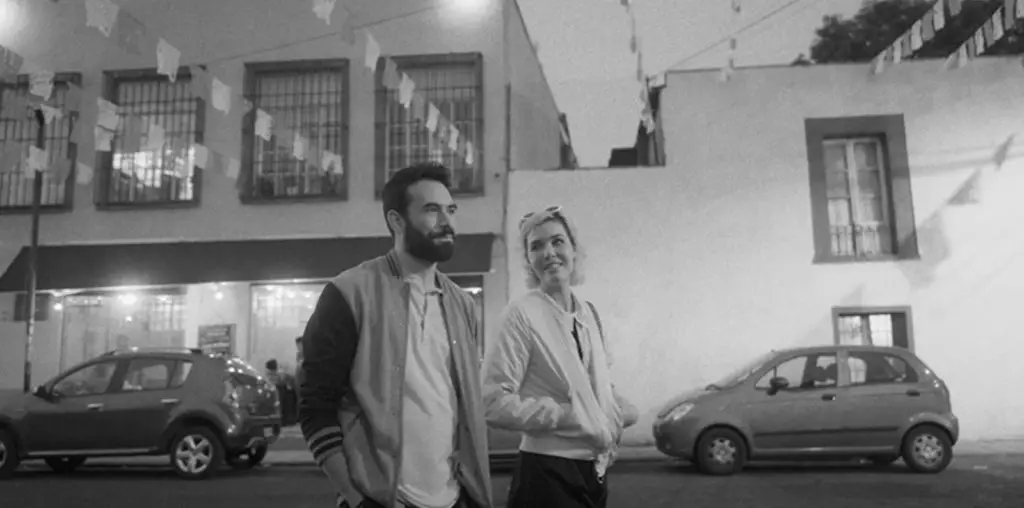
KWIK STOP ^ (2001) ^ by Herb Kane ^ * * * * (out of 5 stars) ^ CRITIC DOCTOR EXAMINES: Commentary from Chicago International Film Festival ^ “Kwik Stop” is a movie about two drifters, Mike (Michael Gilio) and Didi (Lara Phillips) who decided to take a road trip to Hollywood in hopes to make their dreams come true. Getting out of the Midwest isn’t that easy, though.
Didi ends up in jail and Mike actually talks his old girlfriend Ruthie (Karin Anglin), who is still in love with Mike, to help him spring Didi from this terrible place. Ok. So the movie does not make sense at times, but then again – some people don’t make sense sometimes and I’m sure there are girls who will do anything for love.
Roger Ebert didn’t write a review on this movie, but a review from the “37th Chicago International Film Festival Program” said, “Young and old, male and female, all of the characters in ‘Kwik Shop’ are emotionally starving. Love, more of a short-term fix than a long-term commitment, seems to be their only nourishment.”
I enjoyed “Kwik Stop” just because of the interesting characters and it was one of those movies where people get in a car and you never know where they are going to end up. The festival program review said, “Their journey, moreover, turns out to be much more circular than either of them had planned.” They never really get too far, but the story goes a long way.
“Kwik Stop” was chosen as an “overlooked” film at Ebert’s festival because it doesn’t have a distributor yet. In fact, there was one distributor present to see the film. However, this person had to go conduct a speech at the business section of the university. They told Gilio to simply send a tape. Gilio said in a panel discussion following the movie, “This is a perfect example of what we are up against.”
I don’t think that will stop Michael Gilio, though. His acting was impressive. Sure, he wrote and directed this movie. But his on-screen presence is going to get him places. I have big expectations for this actor/writer/director in the future.
TWO WOMEN ^ (1999) ^ By Herb Kane ^ * * * (out of 5 stars) ^ CRITIC DOCTOR EXAMINES: Roger Ebert (Chicago Sun-Times) ^ “Two Women” is a movie with good intentions. Ebert said it’s a movie “about a patriarchal society that puts cruel limits on the freedom of women to lead independent lives.”
I found the movie to pretty basic stuff, even though a critical issue is at hand. We watch how a man stalks a woman and gets away with it – for awhile. An arranged marriage shows us how another man abuses and treats the same woman as if she is of no use other than serving his needs.
Ebert describes him perfectly, “Her husband is a pathetic creature whose self-esteem seems to depend largely on his ability to limit and control her.”
The issue is really shoved down our throats and I doubt any American movie would get away with this. But the fact is, we sympathize for women in this type of society and maybe that’s why this film gets away with it here. “Two Women” gets two stars from me, but I think some of the abusive men portrayed need to get knocked around so they see nothing but stars.
INNOCENCE ^ (2000) ^ By Herb Kane ^ * * * * * (out of 5 stars) ^ CRITIC DOCTOR EXAMINES: Roger Ebert (Chicago Sun-Times) ^ Roger Ebert gave us the perfect opening in his review of “Innocence”: “Here is the most passionate and tender love story in many years, so touching because it is not about a story, not about stars, not about a plot, not about sex, not about nudity, but about love itself. True, timeless, undefeated love.”
I was initially turned off when I discovered the story involved one person cheating on her spouse. In fact, I never did like the movie “The Bridges of Madison County” which starred Clint Eastwood. But this movie was different. It focused on real love – and how it affected three adults in their 60’s. This is a movie every married couple should watch.
We see Claire (Julia Blake) and Andreas (Charles “Bud” Tingwell) in flashbacks as young teens in love. We never hear them, but we see images of what their love was like – embracing and holding each other as if time would stand still forever. Well, time caught up to both of them both now – and their for each other love simply ripened like wine.
When we see Claire with her husband John (Terry Norris), you’ll see just how easy it is to be complacent in your marriage and to take things for granted. John is finally given a wake-up call when Claire tells him about her new relationship with an old boyfriend. He initially thinks she is joking, but later realizes the joke is on him.
I felt for each character in this movie. I admired the way each one handled the various challenges in their life, and the plot offered some spiritual underlayings. Humor was a key element making this story believable and entertaining. Actor Terry Norris is a hoot! Ebert said, “Paul Cox is a director who never loses sight of the humor even in the most fraught situations.”
If you think your marriage is still full of innocence, you might want to give this movie a look. You might brew up a passion for this film – and a new passion for your spouse.
Roger Ebert summed the film up best: “This movie is so wise about love it makes us wonder what other love stories think they are about.”
GRAND CANYON ^ (1991) ^ By Herb Kane ^ * * * * (out of 5 stars) ^ CRITIC DOCTOR EXAMINES: Roger Ebert (Chicago Sun-Times) ^ “Grand Canyon” is my kind of movie. I enjoy watching people who sit back and reflect on life – looking for moments that open doors into other people’s lives to make positive changes, making for a better world and a better life.
We start out watching Mack (Kevin Kline) run out of gas in a gang-infested neighborhood. He is then confronted by black thugs and one reveals a gun and his intention to turn Mack’s night into a deadly game. Then Simon (Danny Glover) a black tow truck driver arrives just in time to talk sense to the leader – and his brutal honesty saves the day. Mack thanks Simon and later in the story decides to go back and make friends with Simon. He wants to help him in some way because he saved his life.
Similar stories take root in “Grand Canyon” – an effort to break down barriers among unlikely people. It forces us to evaluate our own lives, what we hold true and dear to our hearts, our family and our society. It reminds us that we have choices and each choice can change someone else’s life – and change our own life. Even the simple choices like making a left turn in a car is cherished.
Ebert ponders, “How many of those split-second choices do we make every day without even thinking about them?”
You can begin by making a right choice now and go rent this movie. Together, we can all take a trip to the “Grand Canyon.”
Get the whole story in part five of THUMBATHON: ROGER EBERT’S OVERLOOKED FILM FESTIVAL>>>

